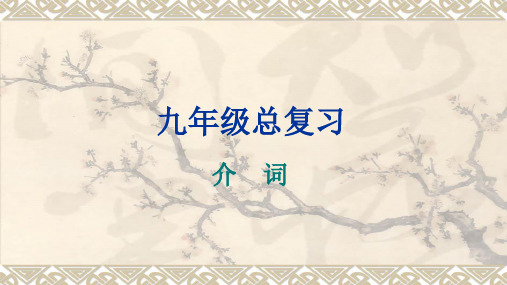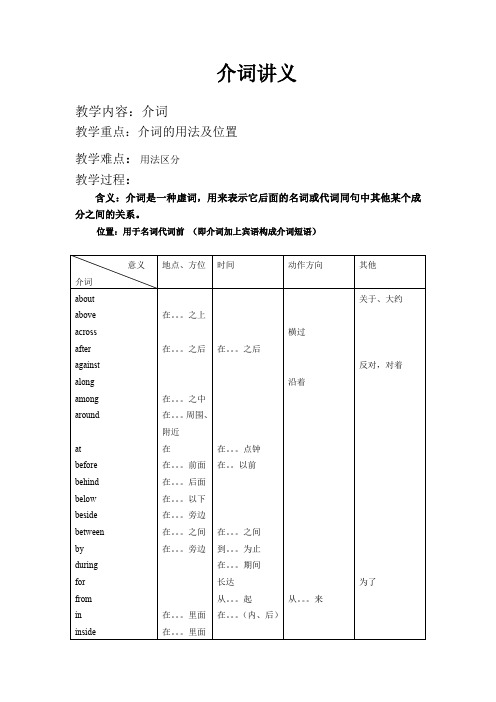介词中考专题讲义
中考介词专题语法讲解(无答案)

学He will wait for you until / till you comes.他将一直等到你回来。
She didn’t know me until / till last week.她直到上周才认识我。
【练一练】1. There are four people __________ my family.A. onB. atC. inD. of2. —How can I get more information about the donation to Ya’an?—You can e’mail Mr. Wang __________ yaanearthquake@.A. onB. inC. atD. by3. —Excuse me. Could you tell Tae the way to the People’s Hospital?—Walk along this street __________ the end and you’ll find it on your left.A. inB. toC. byD. at小结:2.over, above ,on的用法辨析介词用法例句over 在……正上方。
表示一种垂直悬空的上下关系。
Is there any bridge over the river? 河上有桥吗?above 高于……。
表示一物比另一物高,但不是垂直的上下关系,且两者不接触。
A family photo is above his bed.他的床上挂着一张家庭合影。
on 在……上。
表示一物放在另一物的上面,两者必须接触。
There’s a book on the table. 桌子上有一本书。
注意:(1) in有时也可以用来表示“在……上”,但区别于on。
在树上in the tree指非树木本身的一部分的人或物在树上。
2023年人教版中考英语二轮专题复习课件:介词(21张PPT)

3.Although Peter's mom is _d__is_a_b_l_ed___(残疾的), he still takes pride in her. 4. He's a nice boy. He always talks to others _p__o_li_te_l_y_ (礼貌地). 5. Mr. Hunter often gets up e___a_r_ly___ to catch the
(1)+about: be serious about, be crazy about, be sure about
形容词 的搭配 与句型
1.与介 词搭配
(2)+for:be good/bad for, be famous for, be helpful for, be late for, be ready for (3)+of: be afraid of, be full of, be fond of, be proud of, be tired of
2.以“辅音字母加-y”结尾的单词,把-y变成-i,再加-ly, 如: easy→easily, happy→happily
形容词 变副词 的规则
3.以-le结尾的单词,去e加-y,如: simple→simply, possible→possibly 4.以-ue结尾的单词,去掉-e,加-ly,如: true→truly
3.人物情绪类: angry, excited, happy, nervous ,proud, sad, upset, worried
常考 类别
4.人物性格类: active, brave, confident, patient, shy, smart, strict 5.人物状态类: busy, free, full, hungry, lonely, tired, thirsty
九年级英语专题复习教案:介词和介词短语知识讲解(中考资料)

教案编辑专员:九年级英语专题复习教案:介词和介词短语知识讲解(中考资料)章节一:介词的分类和用法教学目标:1. 理解介词的分类及基本用法。
2. 能够正确运用介词表达时间、地点、方向等概念。
教学内容:1. 介词的分类:时间介词、地点介词、方向介词等。
2. 常见介词的用法举例。
教学活动:1. 讲解介词的分类及用法。
2. 学生练习运用介词完成句子。
章节二:介词短语的构成和用法教学目标:1. 掌握介词短语的构成方法。
2. 能够正确运用介词短语表达各种概念。
教学内容:1. 介词短语的构成:介词+名词/代词。
2. 常见介词短语的用法举例。
教学活动:1. 讲解介词短语的构成及用法。
2. 学生练习运用介词短语完成句子。
章节三:介词和介词短语的辨析教学目标:1. 能够辨析不同介词和介词短语的用法。
2. 正确选择合适的介词或介词短语表达意思。
教学内容:1. 辨析常见介词和介词短语的用法。
2. 练习题:判断句子中空格应填的介词或介词短语。
教学活动:1. 讲解介词和介词短语的辨析方法。
2. 学生练习判断句子中空格应填的介词或介词短语。
章节四:介词和介词短语在阅读理解中的应用教学目标:1. 提高学生运用介词和介词短语理解阅读材料的能力。
2. 增强学生对介词和介词短语在语境中意义的理解。
教学内容:1. 介词和介词短语在阅读理解中的重要性。
2. 练习题:根据阅读材料选择合适的介词或介词短语。
教学活动:1. 讲解介词和介词短语在阅读理解中的应用。
2. 学生练习根据阅读材料选择合适的介词或介词短语。
章节五:介词和介词短语在写作中的应用教学目标:1. 提高学生运用介词和介词短语进行写作的能力。
2. 使学生能够正确使用介词和介词短语表达各种概念。
教学内容:1. 介词和介词短语在写作中的重要性。
2. 练习题:运用介词和介词短语完成写作任务。
教学活动:1. 讲解介词和介词短语在写作中的应用。
2. 学生练习运用介词和介词短语完成写作任务。
英语中考语法 介词 课件 (共103张PPT)

for for+一段时间,达……之久(表示经过了多少时间),可以和 一般现在时、过去时、将来时连用,但经常和完成时连用。
from
用于一般过去、一般现在或一般将来时
since
自从……以来(表示从以前某时一直到现在仍在继续)
since+时间点,主要用于完成时或完成进行时
① We go to school from Monday to Friday. (from…to…“从…到…”,不能用于完成时) ② I have been sick since yesterday.我从昨天起就病了。(强调一直病到现在) ③ The doctor has saved a lot of lives since he became a doctor.
A. during B. after C. for D. in
a few
( D )My brother joined the army last year. A. on B. by C. at D. in
September
( A )— How soon will we get the offer from a new high school? — ________about two months.
after+时间点,用于将来时,表“在……以后”
① I went to the cinema befroe 7 p.m. yesterday. ② After two days, the police finally found the lost girl.
两天之后,警方终于找到那个走失的女孩。 ③We are leaving for Shanghai after two o'clock.
中考专题复习--介词课件

介词
二、方位介词 1. at, in. (1) at 后通常接较小的地点,例:at home 在家, at the bus stop 在公共汽车站。 (2) in 后通常接较大的地点,例:in China 在中国, in the world 在世界上。
介词 2. in, on, to. (1) in 表示在某一范围内部;例:Shanghai is in the east of China. 上海在中国的东部。 (2) on 表示接壤;例:North Korea is on the east of China. 朝鲜在中国东面。 (3) to 表示不在范围内,也不接壤。例:Japan is to the east of China. 日本在中国东面。
介词
4. in, after. (1) in,是指以现在时间为起点的“在一段时间以后”,常用于一般将来时,
用how soon提问。例: He will be back in two days. 他两天以后回来。 (2) after,常指以过去时间为起点的“在一段时间以后”,常用于一般过去时, 用when提问。例: He left on Monday and arrived in Beijing after three days. 他星期一离开,三天之后到达了北京。
He didn’t go to bed until 11 o’clock last night. 昨晚他直到11点才睡觉。
介词
6. “by + 时间点”表示“到……时间为止”。 (1) 如果是将来的时间点,句子时态应用将来完成时。例:
We will have learned 500 words by the end of this term. 到这个学期末,我们将学会500个单词。 (2) 如果是过去的时间点,句子时态应用过去完成时。例: He had read three novels by last month. 截止到上个月,他已经读了三本小说了。
中考英语介词讲义

介词讲义教学内容:介词教学重点:介词的用法及位置教学难点:用法区分教学过程:含义:介词是一种虚词,用来表示它后面的名词或代词同句中其他某个成分之间的关系。
位置:用于名词代词前(即介词加上宾语构成介词短语)短语介词:介词+。
+介词:in front of 在。
前面副词+。
+介词:out of 从。
向外固定搭配:动词+。
介词:look after;take care of照顾;照看例题解析1. ---What time did you get there this morning?--- _________ eight.A. InB. OnC. AtD. From2. He has got a chair to sit _______, but nobody to talk ________.A. on, toB. / , withC. on, /D. / , to Where’s Lily? We are all here ________ her.A. besideB. aboutC. exceptD. with Shanghai lies ________ the east of China.A. toB. inC. onD. at习题练习:用适当的介词填空:Last Saturday I was busy ______ my homework .My teacher was very angry ______ me because I was late ______ school again.Kathy prefers a hula hoop ______ a book.I will invite some friends ______ my eighteenth birthday party.How long has he worked ______ an inventor.My uncle arrived ______ the airport ______ the morning of May 3.I will always help my friends when they are ______ trouble.There is nothing ______ air ______ space.I won’t be back ______ June.______ the age ______ twenty, he had written two books.Mary fell ______ her bike and hurt her right leg.He has been away ______ China ______ three years ago.When I was ______ school, I was ______ the school football team.I think he will be ______ two o’clock.The teacher was given some flowers ______ his students.Look, the birds are singing ______ the tree.He left the classroom ______ all the windows open.My sister is ill today. She doesn’t feel ______ eating anything.It’s too dangerous. You must keep the children away ______ the fire.My parents arrived ______ a cold night.You should apologize ______ her ______ stepping on her foot.The students are sitting ______ the table, reading the newspaper.The city is famous ______ its football, and people there are very proud ______ their city football team.We are doing better ______ English ______ our teacher’s help.Don’t worry ______ me. Everything is going well ______ me.He was late ______ school today, and she came late ______school, too.------ Do you know what happened ______ Peter yesterday?------ He was hit ______ a car.I like clothes made ______ cotton.He will go to Hangzhou ______ his car tomorrow.______ my surprise, the Englishman gave up halfway ______the end.I saw the great changes ______ my own eyes.You look tired. Instead ______ working indoors you should beout ______ a walk.Wushu is becoming more and more popular ______ foreigners.If you are able to get the tickets tomorrow, please tell me ______phone.There is going to be a report ______ Chinese history ______ ourschool this evening.Before 1990 there was no airline ______ the two cities.She is dressed ______ a white skirt ______ red flowers.It’s bad ______ you to go to work ______ break fast.It’s very nice ______ you to get me two tickets ______ the WorldCup.------ Where have you been these days?------ I have been to Bei Daihe ______ a friend ______ Canada.------ Would you like some coffee?------ Yes, and please get me some milk, too. I prefer coffee ______ milk.------ When did Mr Smith come here?------ ______ nine o’clock yesterday morning.You must stand ______ line when you are waiting ______ a bus.------ Jack, will you be home ______ time to see the children before they go to bed?------ No problem.China lies ______ the east of Asia and ______ the North of Australia.46. If you can’t pass the exam, you’ll fall ______ others.47. I have a swim every day ______ yesterday.48. We all know that the earth moves ______ the sun.49. The sunlight is coming in ______ the window.50. This room is full______students and that one is filled______ teachers.。
最新中考英语专题讲义:介词、数词(带答案)

中考英语专题讲义:介词、数词(带答案)1.We work five days week.A.aB. anC. theD. /2.book on the desk is useful one.A.The; anB. A ; aC. The; aD. The ; /--- exciting news it is!A.WhatB. HowC. What anD. How an7.delicious these beef noodles are!A.WhatB. HowC. What aD. How a8.Look! happily the children are playing over there!A.HowB. WhatC. What aD. How a9.honest man he is!A.WhatB. What anC. HowD. How an10.--- interesting the film is!---Yes. I have seen it twice.A.WhatB. HowC. What anD. How an参考答案:1-5 ACCBD 6-10 ABABBTwo young boys were spending the night at their grandparents’. At bedtime, the two boys knelt beside theirbeds to say their prayers when the younger one beganpraying at the top of his lungs. “I pray for a bicycle. I prayfor a new VCR.”His older brother asked, “Why are you shouting yourprayers? God isn’t deaf.”To which the younger one replied, “No, but Grandma is!”介词1.Guangdong is the south of China, and it is the north of Hainan.A.in; onB. on; inC. in; toD. to; in2.There is a bridge the river. And he often walks theC. in front of; at the back ofD. in the front of; at back of5.Two planes are flying the city.A.throughB. overC. onD. below6.Is there any difference these two sentences?A.forB. inC. amongD. between7.I was born eight o’clock January 4th1991.A.in; at; onB. on; in; atC. at; on; inD. at; in; on8.He has been here 2012. In another word, he has been here4 years.A.for; forB. for; sinceC. since; forD. since; since9.We visited Beijing last Sunday, and he came back two days, but I will come backA.in; afterB. after; inC. in; inD. after; after10.All of us have come Tom. And the boss still needs 5people us.A.except; besidesB. besides; exceptC. except; exceptD. besides; besides11.---What’s this English?---It’s an apple. And you can cut it i nto half a knife.A.in; withB. with; inC. in; inD. with; with12.Alla usually goes to work her car, but today she goes theretaxi because her car was broken.A.by; inB. by; byC. in; byD. in; in13.Miss White looks her mother. She is good-looking, too.A.afterB. forC. likeD. at14.Bob, don’t read the sun. It’s bad your eyes.C. without; withoutD. without; with数词1.There are people in Jack’s family. Theylive in the building.A.five; fifthB. five; fiveC. fifth; fifthD. fifth; five2.Sunday is day of the week.A.the firstB. oneC. the seventhD. the seven3.One million six hundred and seventy-eight thousandnine hundred and thirty-two is .A. 1678932B. 6789123C. 1698723D. 160789324.We can see stars at night if it is fine.A.thousand ofB. two thousandsC. three thousands ofD. thousands of5.I think is as easy as .A.Lesson two; Lesson 1B. Lesson 2; Lesson oneC. Lesson 2; Lesson 1D. lesson 2; lesson 16.They spent in making the cake.A.an hour and a halfB. half and an hourC. an and half hoursD. a half and an hour7.---When is Children’s Day?---It’s on .A.June 1stB. July 1stC. June the secondD. July the first8.In our school, of the students are boys.A.two thirdB. three fifthC. four-fifthD. four sevenths9.---Would you like some fruit, madam?C. 20-meter longD. 20-meter wide12.When John was , he went to London to go on his university.A.on his twentiesB. in his twentiesC. in the twentiesD. in his twenty13.At the age of , he had his own lab.A.thirtyB. thirtiethC. the thirtiethD. the thirty参考答案:介词:1-5 CBABB 6-10 DCCBA 11-15 ACCCC 16-17 BB 数词:1-5 AAADC 6-10 AADBD 11-13 BBA介词【题目分析】1.考查表示两地位置关系的介词:in,on,to。
中考专项复习介词课件

• 介词概述与分类 • 介词辨析与运用 • 介词固定搭配与短语 • 介词在句子中位置与功能 • 介词在完形填空与阅读理解中运用 • 练习与巩固提高
01
介词概述与分类
介词定义及作用
介词定义
介词是用来表示名词或代词与句 子其他成分之间的关系的词。
介词作用
among:表示三个或多个 物体之间。
after:表示某件事情发生 在另一件事情之后。
between:表示两个或多 个物体之间。
表示“在...之后”的介词: after、in
in:表示某个时间段之后 。
介词在不同语境中运用
表示时间上的先后顺序
01
before、after
before
02
表示某个动作发生在另一个动作之前。
表示“在...里”的介词
in、within、inside
in
表示某物在某一物体的内部,且物体边界清晰。
相似介词辨析
within
表示某物在某一物体的内部,但物体 边界不清晰。
inside
表示某物在某一物体的内部,且物体 边界清晰。
易混淆介词辨析
表示“在...之间”的介词: between、among
in a hurry:匆忙 on purpose:故意地
中考中常见介词短语运用
考查固定搭配
中考中常考查介词固定搭配,如 "in the morning"、"on the
phone"等,需要考生准确记忆并 正确运用。
考查短语意义
中考中还常考查介词短语的语义, 如"in a hurry"表示"匆忙",考生 需要理解并掌握短语的准确意义。
- 1、下载文档前请自行甄别文档内容的完整性,平台不提供额外的编辑、内容补充、找答案等附加服务。
- 2、"仅部分预览"的文档,不可在线预览部分如存在完整性等问题,可反馈申请退款(可完整预览的文档不适用该条件!)。
- 3、如文档侵犯您的权益,请联系客服反馈,我们会尽快为您处理(人工客服工作时间:9:00-18:30)。
介词一.表示时间的介词1. in, on, at在……(之时)①in与年、季节、月、年代、世纪及一般(泛指)的早、中、晚等较长时间的词连用eg: in summer在夏天; in January在1月;in 2012 在2012年; in the morning在早上 in the 21st century②on用于具体的某日或某特定日期的早、中、晚。
如:on August 8th在8月8日; on Monday在星期一;on New Year’s Day;on a cold morning在一个寒冷的早晨;on Sunday afternoon在星期天下午。
③at表示某一时刻。
如:at 5∶10pm 在下午5∶10; at the beginning of在开始时;at the end of...在……的末尾;at the age of...在……岁时; at noon在中午;at the same time在同时。
at night在晚上;2. in, after 在……之后“in +时间段”用于将来时之中;“after+时间段”用于过去时态之中;“after +时间点”既可用于将来时也可用于过去时。
如: Jim will go to Beijing in five days. 吉姆五天后会去北京。
Jim went to Beijing after five days. 五天后,吉姆去了北京。
Jim will go to Beijing after five o’clock. 吉姆会在五点钟后去北京。
3. for, sincefor可以指过去、现在或将来,着重说明“多久”,后面接时间段。
since意为“自从……起”,多与完成时连用,后面接时间点或从句。
since引导的从句通常为一般过去时。
如:He has lived here for 2 weeks. / He has lived here since 2 weeks ago. It’s five years since he left school.4. after, behind 在……之后after主要用于表示时间;behind主要用于表示位置。
如:You should take a walk after dinner. /The picture is behind the door.二.表示地理位置的介词1. in, on, to1).in表示A地在B地范围之内.(包含关系) 2).on表示A,B地接壤.(外切关系) 3).to表示A,B两地有一定的间距.(外离关系)Hubei is ___ the north of Hunan /Tanwan is ___ the southeast of China . /Japan is___ the east of China .2.at/in/on1)at 接小地点或较具体的位置”。
at home/ at the station 如:He arrived at school at 8 o’clock. 他8点钟到学校2)in 接在大地点 in China; in the world ; He arrived in Wenzhou yesterday. (较大地点)3)on 表在一个平面上 on the farm3. above, over, on 在……上①above 指在……上方,表相对高度,不强调是否垂直,与 below相对;The bird is flying above my head. 鸟在我的头上飞。
②over指在……正上方,表垂直的高度,与under相对;There is a bridge over theriver. 河上有一座桥。
③on表示某物体上面并与之接触。
如:There is a book on the desk.4. below, under 在……下面; under表示“在……正下方”; below表示“在……下,不一定在正下方”。
如:There is a dog under the desk./ Please write your name below the line.5.in front of / in the front of(1).in the front of 表示在…….内部的前面;(2).in front of 表示在……外面的前面There is a desk in _____ front of our classroom . There is a big tree in _____ front of our classroom.Ⅲ.表运动方向和位置的介词更多资料制作:1. across / through / over / by 经过①across 指横穿,穿过. 表示动作从某一物体表面上经过.②through 指穿过,透过,表示从某一物体空间内通过.③over 表示从某人或某物的上空经过或越过,不与表面接触. ④by/past 表示从某人/某物的旁边经过.Can you swim ______ the river ? / The elephant is so big that it can’t go _____ the gate .I don’t think anyone can jump ___ the fence. / I walked _____ the bank of China yesterday .2. between, among① between指在两个人或两个事物之间;There is a bank between the post office and the police station.② among指在三个或三个以上的人或事物之间eg:The teacher is standingamong the students.3 . in, into, out of①in:在……里面,用于表示静止的位置。
Her mother works in the hospital.②into:进入,用于表示有特定终点的运动方向,经常与表示动作的动词连用如,come, go, run, rush等。
The child ran into his mother’s arms.这小孩跑进了它妈妈的怀里③out of:从……里出来,与into一样,也表示有一定的运动方向。
如:All the children rushed out of the classroom when the bell rang.四.表示方式的介词 with / in / by 表示“用……”1.with 表示“用…” 一般指有形的工具 / 手段 / 人体器官.He cut the apple into halves ____ a knife . 注: with 表伴随, “带有,含有”He came in _____ a big smile on his face .2.in a)表示用某种语言,方式,途径. 或书写/绘画所用的材料..Can you say it _____English ? / He wrote a letter ____ blue ink .b)以…方式in this way 用这种方法 behave in a polite wayc)也可表交通方式travel in a car d)“穿着” in red穿红色的衣服3.by a)表示乘坐交通工具, travel by busb)以……方式、方法或手段 I study for a test _____ working with a group .4. on a)通过 study on the air/radio通过广播学习 b)乘坐on a bus/ on a bike注意: 1).by phone = on the phone 2).by car = in a car 3).in pen = with a pen = with pens五.范围介词In 在。
里边 in our class between 在两者之间 between us among 在三者或三者以上的中间 among studentsbesides 除了。
之外还有(包括后面的宾语)Tom,Jim besides Lily.except 除了。
之外(不包括后面的宾语)Tom,Jim except Lily.including包括 All the students including me.六.介词词组辨析1. on the tree /in the tree①on the tree 表示“树上本身长的东西” 在树上. ②in the tree 表示“外界的物体进入树中” 人或物在树上.There are some apples _____ the tree ./ There is a boy ____ the tree.2.in the wall /on the wall①in the wall 表示“门窗在墙上” ②on the wall 表示“某东西张贴或挂在墙上”a picture the wall the window the wall3. .except / besides / except for1).except 除了…之外, 都… 不包括在范围之内,排除同类的. We all went swimming except Lucy .注: nothing but …除了…之外,什么也没有. There is nothing but a letter in the box .2).besides除了…之外,还有… 包括在范围之内. We study Japanese and French besides English3) except for 句中的主语与except for后的宾语不同类:Smith is a good man, except for his bad temper. 史密斯除了脾气不好外,是个好人.4. .with / without1).with具有,带有反义词: without 没有词组: with the help of = with one’s help 反义词:without one’s help2).without 的用法:A).without + sb./ sth. 没有某人或某物B).without + doing sth . He left here without____(say ) “Goodbye”to usC). without sth 常与if 引导的否定的条件句. If there is no water , we can’t live .= We can’t live ______ _______ .5.be made +介词的区别:(见九上笔记)be made of 由…制成 (看得见原材料);be made from由…制成 (看不见原材料)be made in +地点由哪儿生产; be made by sb. 由某人制造6. since / for 注: since / for 常用于现在完成时.1).since : a).since +时间点;b). 现在完成时+ since +一般过去时;c).since +一段时间+ ago.2)for: for +一段时间= since +一段时间+ ago七.其他固定搭配be full of充满; be filled with装满……; be born in出生于; be sure of确信;be used to 习惯于…; be late for迟到;be strict with sb对某人要求严格; be excited about对…感到激动。
